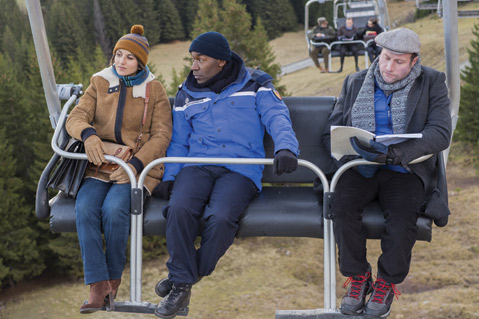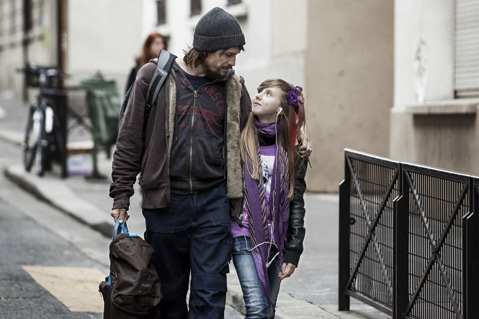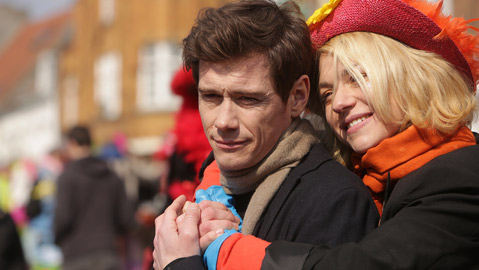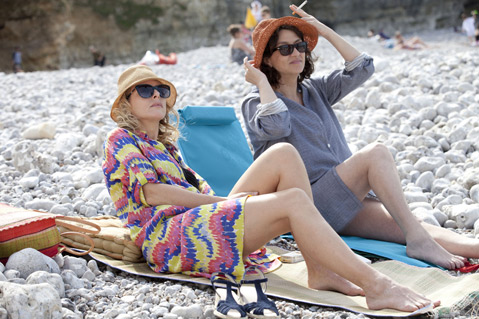Roger Durling’s Permanent Wave
SBIFF Adds a French Mini Festival

It isn’t total world domination that Roger Durling craves, though an ever-expanding film fest is clearly part of his non-sinister, not-so-secret plans. Now nearing its third decade, the Santa Barbara International Film Festival (SBIFF) continues to spread. “We always wanted to offer year-round programming,” Durling said last week, munching on smoked tofu at Zen Yai. “After we got the Showcase program off the ground [the Wednesday-night indie film screening series at Plaza de Oro Theatre], my dream was to offer a mini-festival every quarter, representing films from a single country.” Hence next week’s Wave Film Festival at the Riviera Theatre. “We want to do a different country for every Wave,” he explained. “French films just seemed like the most obvious place to start, mostly because they have such a well-established film industry and they make films in so many genres: thrillers, mysteries, romance.”
“This will be our first summer Wave, but I think we can move to other seasons and other countries, too.” Those other countries include Italy and Russia, which also have productive, well-established industries, and will likely be the next waves, if this one breaks well.
Durling got some help from the French Consulate and his many established connections to gather the films, and the quality of the movies is uniformly high — especially viewed in contrast with Hollywood’s last two months. So stay tuned because SBIFF now has its eyes on conquering the little box offices in town. It may not be total domination, but it’ll surely be a presence. “We’re happy to be the upstarts, launching a year-round show after 30 years of tried-and-true fests.” Below, we take a sneak peak at some of the films in SBIFF’s new wave.
Playing Dead (Jefais le mort)
Here’s a whodunit with a great premise that’s wrapped up in the detective. Take a two-bit actor whom every director in Paris is sick of arguing with. Now turn that cliché on its head, and you have the making of a terrific sleuth who questions every motive and stirs through unlikely scenarios for circumstances. The true genius of this film rests in the way a pain in the neck can become a perfect Sherlock.
François Damiens plays Jean Renault, which is the second sly film joke — people keep expecting him to be Jean Reno. Instead, he’s a balding twit, recently separated from his wife and inept but loving as a parent. We keep seeing different sides to our chief hammy protagonist, and it makes the whole film feel wonderfully unpredictable — a good thing for a mystery.
And the scenery is beautiful, too. Director Jean-Paul Salomé nicely frames the crisp French Alps and the little village where a murder and a reenactment serve to upset the social order, spark some sexy time, and remind us that the French have a centuries-old reputation for logic and reason, which is only matched by their love of the absurd.

Brotherhood of Tears (La confrérie des larmes)
Another mystery, but this time the broken-family sleuth is a disillusioned former cop, with a free-spirited (or at least multicolor-coiffed) daughter who seems to be the only stable household member. When he’s offered a job that mixes zero responsibility with outlandish paychecks, it doesn’t take long for even our boozy hero to realize something is seriously amiss.
Tears is stylishly shot and meanders around the globe like a Bond film. Maybe you won’t take extreme delight in the final revelations, but the film will get you thinking about responsibility and how money and power can create some seriously jaded humans. It may sound a little stiff, but it’s intriguingly paced and far better than any film Luc Besson made in the last 10 years.

Not My Type (Pas son genre)
Writer/director Lucas Belvaux is at the helm of this adorable but cliché-ridden rom-com romp, which finds a brooding Parisian philosopher (Loïc Corbery) relocating — against his will — to a tiny working-class town called Arras. Passionately opposed to leaving his cosmopolitan high life behind, our protagonist reluctantly settles into his new home, meets a beautiful but crass hairdresser, and, well, you can probably guess the rest. Playing the Odd Couple card is no hat trick, but Belvaux’s characters ultimately redeem the tale. Case in point: Belgian bombshell Émilie Dequenne, who breathes new life into her role as a plucky, Jennifer Aniston–worshiping simpleton who steals our scholar’s heart. Combined with cinematographer Pierric Gantelmi d’Ille’s sprawling and unexpected wide-angle shots, Dequenne manages to elevate Not My Type from formulaic to sweetly off-kilter, making for a film that succeeds in spite of itself.

Weekends in Normandy (Week-ends)
Two couples, all best friends, settle into neighboring weekend homes in picturesque Normandy, where it’s all brunches and seaside walks — until real life worms its way in. Things start to unravel when Jean decides to leave his wife, Christine, and worsen when Christine begins to feel ostracized by her former BFFs, Sylvette and Ulrich. Passions flare, relationships clash, and somehow, the four friends find themselves among the rubble. Director Anne Villacèque steers what could have easily been a downer story into a good-humored, meaningful, and naturalistic examination of the ups, downs, and in-betweens of all relationships. Spurred on by a solid cast, Weekends in Normandy offers up some all-too-relatable characterizations that hit home in equal measure. Paired with a nifty chronological trick that has all the action taking place over weekends at the shore, it makes for an instinctive drama that looks and feels light and airy — a perfect blend for summer moviegoing.
Suzanne
Katell Quillévéré is the young (34) director behind this stunning, raw, and emotionally rich offering. Sara Forestier plays Suzanne, a waifish, doe-eyed girl who gets knocked up by a mysterious lover and then decides to keep the child. With little support, the young single mom flounders through life and love as her sister and her father satellite around the proceedings. It may not offer much in the feel-good department, but Suzanne shines brightly in the wake of its brutal subject matter, thanks in no small part to Forestier, who delivers a tour de force performance that stays with you long after the credits role. On the other side of the camera, Quillévéré smartly maneuvers between past and present with breakneck precision, oftentimes hitting her audience broadside with a number of fast-paced (and intentionally disorienting) plot twists. That said, strong characters and even stronger performances are the glue that holds Quillévéré’s nonlinear tale together. A buzzworthy entry in 2013’s Cannes Film Festival, Suzanne easily lives up to the hype.
4•1•1
The Santa Barbara International Film Festival presents The Wave Film Festival: France at the Riviera Theatre Wednesday, July 16-Sunday, July 20. For info, visit sbiff.org.



